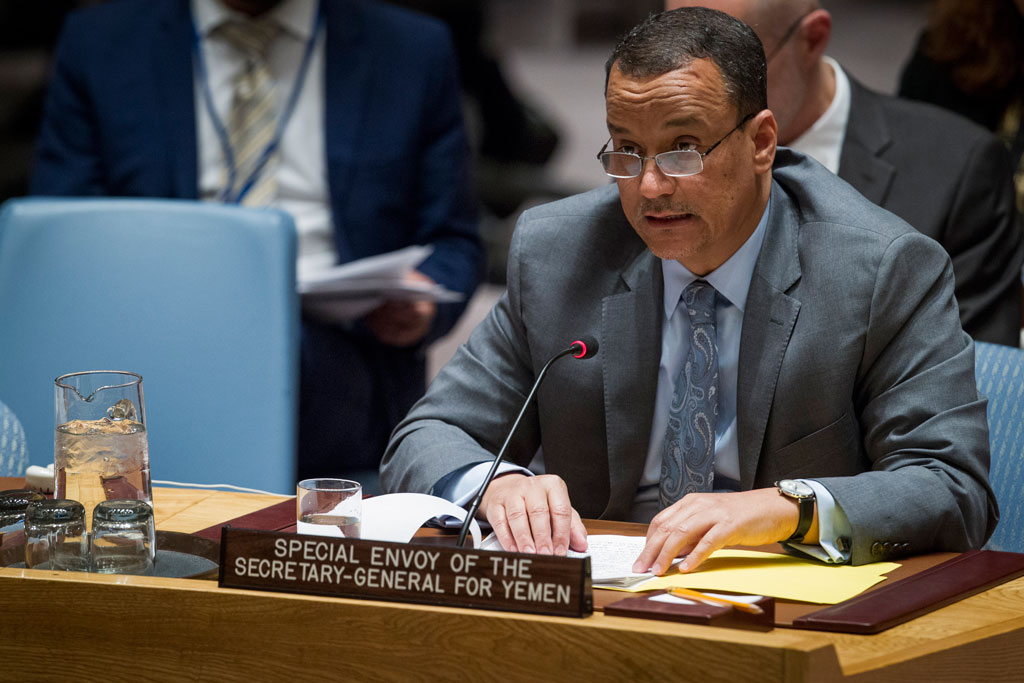New York, London- Houthi rebels insist on rejecting a peace deal proposed by U.N. Special Envoy to Yemen Ismail Ould Cheikh Ahmed, despite pressure exerted by the ambassadors of the 18 countries backing political talks in Kuwait.
Yemeni sources close to the matter told Asharq al-Awsat newspaper that the international community has notified the Houthi delegation that political negotiations will not go forward if both parties fail to sign and implement the conditions of the new roadmap.
News agencies reported that Ould Cheikh Ahmed has informed the United Nations Security Council during a closed session on Wednesday that Houthi rebels have refused to sign the latest peace deal.
Saudi Arabia’s permanent representative to the U.N. Abdullah Al-Muallimi told Asharq al-Awsat newspaper that Russia has hampered the issuance of a press release that expresses international concern over Houthis’ announcement to forge a formal alliance with the country’s ousted President Ali Abdullah Saleh and set up a political council to rule the country. The press release described Houthis’ step as jeopardizing peace efforts.
According to information received by Asharq al-Awsat newspaper, the U.N. special envoy asked the Security Council to issue a statement stressing the importance of Yemen’s peace negotiations held in Kuwait and describing Houthis’ political council an “unconstructive step that does not serve peace in Yemen.”
Sources with knowledge of the matter said that Russia’s U.N. Ambassador Vitaly Churkin objected to the announcement of the Security Council’s statement, as it did not include a reference to the “national unity government” that Houthi rebels were calling for.
Ould Cheikh Ahmed had described Houthis’ announcement to form a political council as a unilateral measure that violates Yemen’s Constitution and the relevant international resolutions.
Meanwhile, an official at the Yemeni government’s delegation to Kuwait said that the rebels did not submit any comments regarding the peace deal. He added that the Houthis were insisting on the formation of a government and a presidential council.
While the items of the U.N. peace deal were not officially announced, sources told Asharq al-Awsat newspaper that the government’s delegation stressed, upon signing the agreement, that the deal should be considered void should the rebels refuse to sign it before the end of the second round of negotiations on August 7.
Yemeni President’s advisor Nasser Taha Mustafa told Asharq al-Awsat newspaper that the Houthis did not want peace but were seeking international recognition of their rebellion. He added that any solution to Yemen’s crisis should be based on U.N. Security Council Resolution 2216, which gave the rebels the right to actively participate in the country’s political life.
Mustafa urged the international community to exert more pressure on the Houthis to sign the peace deal.
The second round of intra-Yemeni peace talks was launched in Kuwait on July 16. Yemeni governmental sources said that Ould Cheikh Ahmed’s draft plan calls on the rebels to withdraw from three major cities, including the capital Sanaa, hand over weapons and return state institutions they seized in September 2014.
Meanwhile, the Organization of Islamic Cooperation (OIC) called on the Yemeni warring parties to continue holding peace talks that are being hosted in Kuwait.
In a statement issued on Wednesday, the OIC expressed its support for the statement by the group of ambassadors accredited to Yemen on the Yemeni peace talks, which called on the government delegation to continue the peace talks. The statement had also commended the readiness of the government delegation to accept the latest proposal by the Special Envoy aimed at sealing an agreement that would end the Yemeni crisis.
